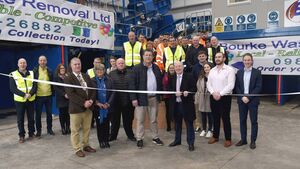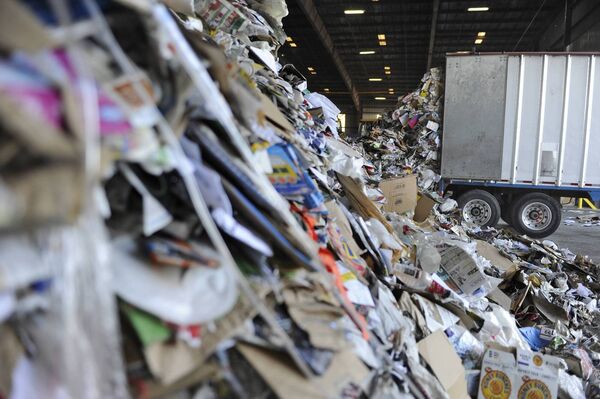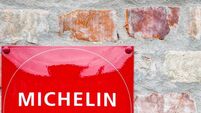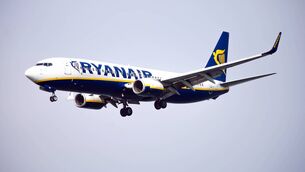Mayo waste ends up in a Dublin cauldron

Stanley Bourke, of Bourke Waste and Recycling, Clogher, Westport, with family members, employees and local representatives, including Michael Ring TD who performed the official opening of the firm's new state-of-the-art skip sorting facility in Westport eariler this year. Picture: Conor McKeown
Four or five trucks a day ply the long road from Stanley Bourke’s yard in Westport to Poolbeg on the south Dublin coast. Not many customers of the family business, Bourke’s Waste, know that within ten hours of arrival in his yard, the contents of their bin are on the road to a giant incinerator facing the Irish Sea.
Just as not everyone who puts out a black and a blue bin every week to be collected by Bourke’s trucks realises that the contents will end up in a Dublin cauldron they’ll also be unaware that Bourke pays to tip a load at the incinerator, operated by the American-based Covanta corporation. A tipping charge of €150 per ton means Bourke typically pays €3,700 each time one of his trucks tips at Poolbeg.
The Government meanwhile closed landfills to comply with EU regulations, leaving waste companies no alternative but to go to the Poolbeg plant, which also produces electricity.
“Whether I like it or not I have to transfer to them,” said Mr Bourke.
A new €10 levy on black bins - intended to improve recycling - introduced from September 1st will add to Bourke’s costs. Ireland has three active municipal landfills taking about 16% of municipal solid waste but the bulk of waste is now headed to the country’s two dedicated “thermal treatment” (the preferred official and industry term for incinerators) plants in Poolbeg and in Meath.
These are operating at capacity, burning a million tons of rubbish a year. Waste is also taken to three cement plants that are authorised for “co-incineration” – using municipal waste as a feedstock for the clinker process – but only two-thirds of capacity is currently used.
The new levy is intended to force waste companies to be more careful about segregating waste before coming to the incinerator. Stanley Bourke, however, thinks that trucking Mayo waste to Dublin makes little environmental sense.
“We are a small country and there are not many options. Originally, the plan was to build three waste-to-energy facilities in Ireland, Dublin Cork and Galway. But only one happened. The government didn’t help it either. If we had one in Galway there would be lower transport emissions.”

Not all the trucks leaving Bourke’s yard head to Poolbeg. He also pays a private company to take his recyclables: Thorntons in Dublin charges up to €100 per ton of paper and plastic dropped at their door from the blue bins collected by Bourke Waste. There’s been more of that lately.
“During Covid, when people were locked up at home, they bought in more and so there was more packaging and so we collected more recyclables like paper,” explains Mr Bourke.
One of over 2,000 private operators who handle Ireland’s waste, Bourke’s Waste faces policy changes as governments everywhere try to hold back the tide of plastic. In Ireland and globally, waste volumes are soaring: plastic waste has doubled in volume over the past two decades and quadrupled since the early 1990s, according to the Organisation for Economic Cooperation and Development (OECD).
In Castlebar, Kevin Swift is the Regional Waste Coordinator for the Connacht-Ulster Waste Region of local authorities. Located at the Mayo County Council headquarters, Aras an Chontae, Swift’s office is required to enact the Circular Economy and Miscellaneous Provisions Act 2022, national legislation drafted to match EU plans for reducing plastic waste in particular.
To that end, Swift’s office and colleagues in the south and east of the country have set a plan for the period 2023-2029 to reduce waste, a draft of which was shared for this article. For example, the plan sees a reversal in the recycling of waste from 41% in 2020 (compared to a target of 50%) to 65% in 2025 and 70% in 2030. Food waste of 770,300 tons in 2020 is to halve in 2030 under the plan.
The targets are bold but it’s not clear if they’re achievable. After all, Ireland has the fastest-growing population in the OECD and one of the strongest-growing economies in GDP terms. That means a larger volume of municipal waste, said Conor Walsh, who is the secretary-general of the Irish Waste Management Association (IWMA).
At an average 645kg per capita, Irish per capita waste is higher than the EU average of 517kg.
“It moves up and down in response to economic activity, particularly commercial waste,” explains Mr Walsh.
However, the total volume of municipal solid waste in 2023 is similar to levels in 2007 (that volume dropped 20% from 2007 to 2012 after the demise of the Celtic Tiger) which suggests either a levelling off of waste levels on a per capita basis or a return to levels seen during the height of the consumption and construction splurge in the first decade of the new millennium.
To figure out how to reduce our output it may be best to look to the source of the country’s waste. A new survey of households across the country traced 66% of waste items in Irish recycling bins back to retailers.
The ‘Sick of Plastic Survey’ by VOICE, an environmental NGO, found that 59% of these supermarket waste items were made from plastic and that 40% was packaging from the supermarkets’ own brand products. If Ireland is to achieve its targets for reducing waste, local retailers will have to stick to promises to cut back on plastic. The evidence suggests the contrary.
The VOICE survey suggests that plastic volumes are increasing despite efforts by individual retailers, according to Tad Kirakowski, CEO of Voice.
“We need a system change, we need to change the ground rules on plastic use because if we have to wait on individual retailers it will take a very long time,” he said.
Leading Irish supermarket chain SuperValu has set a target of making its own brand packaging “either recyclable, reusable or compostable” by 2025. That doesn’t necessarily mean less volume headed to household bins.
And yet there is hope elsewhere. While it’s difficult to see how retailers will, without duress, reduce plastic waste it’s much easier to see progress in diverting food and other organic waste away from incinerators or landfills.
A third bin colour that Stanley Bourke wants to collect more is brown in colour. Less organic waste in the black bin means less sent to Poolbeg so he’s mailed brochures to all his clients advertising special introductory rates to take the brown bin – the contents of which can be turned into valuable garden compost.
“Thornton’s [the same company that buys his paper and plastic recyclables] parks a 25 or 26-tonne truck in my yard, they have a huge compost plant in Nobber [Co Meath] and the end product is excellent. When you see it in 12 weeks after collection you say ‘My God, it’s great!’.”
Diverting weight from the black bin saves him money but getting the brown bin into every doorway will take time. Stanley wants to see tax credits being employed to encourage the take up of brown bins by households.
“It’s a slow burner, the commercial take up is good because there are huge volumes,” he says. “But for the household, you have to start at schools to change mindsets.”
Similarly, there’s some optimism that recycling targets set by Coca-Cola and other soft drinks firms to use recycled plastic have lifted the value of the blue bin contents, making recyclables more valuable, though prices vary based on the colour and level of contamination of the plastic, explains Conor Walsh at the IWMA.
Some 75% of the contents of the average blue bin are fit for recycling, explains Mr Walsh. The non-recyclable gets burnt. There are other ways to extract value from waste – there are two experimental plants being built to capture the biogas from the organic contents of the black bin waste stream.
Contamination reduces the value of recyclables – milk spilt on paper for example. The worst are the nappies.
“Some people hide dirty nappies in their recycling bins and this is a real problem,” explains Mr Walsh.
Conor Walsh also wants householders to take textiles, wood and glass out of recycling bins and to civic amenity centres.
If we are to recycle more waste that will depend on buyers elsewhere. Irish recycling relies on overseas markets for wastepaper and plastic, he explains. Building local facilities is part of the process of improving recycling levels.
The ideological question of privatisation of waste collection appears to have been replaced by a new urgency to reduce waste volumes headed to incinerators and landfills. Stanley Bourke’s business of collecting waste from households and businesses in West Mayo will continue but the end destination for some of that waste may well change.





